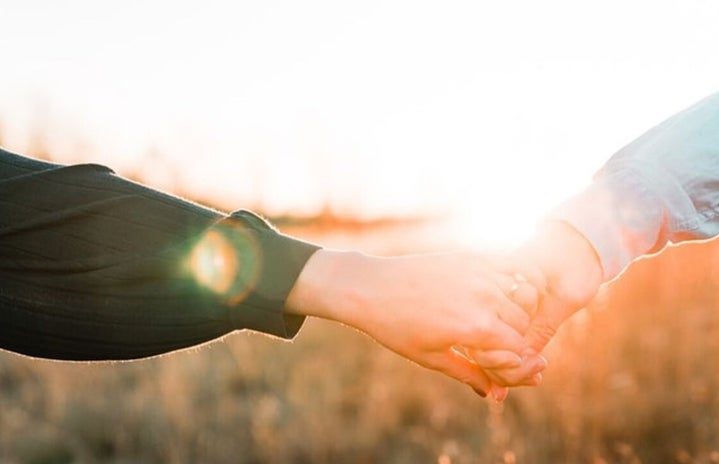This November marks two years since I travelled home from my first 6 weeks at university, expecting to find everything exactly how I left it. At large, it was the same; a clutter of shoes at the bottom of the stairs, newspaper scattered across the kitchen table, the odd leaf sprinkled on the wooden floor kindly brought in by my dog after an autumnal walk- but everything had changed. I felt like the most stable part of my life had been swept from under my feet, knocking the air out of my lungs and leaving me helpless and paralysed by fear.
It was in November 2018 that my Dad was diagnosed with a brain tumour. Within a single conversation, a single diagnosis with the doctor, that our lives were turned upside down, inside out and were (what felt like) torn at the seams. Cancer is a scary word, and it’s one of those things that’s easy to feel detached from. You never think it’ll be you or someone that you love. I remember growing up, having friends of friends whose relatives had cancer, or a distant family member going through chemotherapy, but I never once stopped to consider the fact that one day, I could be the ‘friend’s friend’ whose dad has cancer.
I was confused, how could my dad, a man who is more active than his 22-year-old son and was known to devour a plate of 5 fruits every evening, possibly have this thing inside him that was threatening his life. When we’re children our parents seem indestructible. For most of us, their health and wellbeing is not something we need to worry about. But as we get older, we must come to terms with the fact that this is not always the way things will be. Our parents, unfortunately, are not superheroes, and they are just as vulnerable to life’s ups and downs as anyone else.
Looking back on my initial response to the news, I can see I wasn’t coping. I didn’t know what to tell people, why I was going home so much, or why I was facetiming my family every night sobbing from my room. I didn’t want the pity, or people to think I was fragile, stepping on eggshells and watching what they say to ensure I didn’t weep upon the mention of someone’s father. I felt the immense guilt of being away from home at university, and the guilt of my life carrying on despite his diagnosis. I was even embarrassed to tell people, not wanting to make anyone feel uncomfortable because after all, there are no words that can make the pain, or the cancer, go away. For the most part, I kept it all to myself, which definitely did more harm than good and meant that when someone did ask how my dad was doing, I’d break down after not having talked about how I was feeling for so long.
Sleepless nights kept awake by the ‘what-ifs’ and the thoughts of the worst-case scenario haunted me. I remember having an extremely candid conversation with my mum a few months into my dad’s treatment. At this point, I didn’t really know (or want to know) the reality of the situation- I knew he was very sick but the severity of the circumstances I wasn’t sure I could cope with. We were sitting in our favourite coffee shop as she explained to me that this was how our lives would be now. We couldn’t go back to how things were a year ago- this was our new normal (to coin a well-used covid phrase), hospital trips, surgeries and MRI scans. I sobbed into my £3 cappuccino.
Although the reality of having a parent with a long-term illness is something that never fully leaves your mind, it is something that with time, you learn to live with and not necessarily accept but adapt to. Finding moments of light relief really got me through when I felt at my worst. On my dad’s first round of treatment, one of the side effects he experienced was heightened laughter. We’d be having dinner, en famille, and someone would make a joke, a joke which would elicit little more than a chuckle from around the rest of the table. But my dad would be in stitches, giggling like a little child- which in turn made the rest of us cackle, watching him sit there, shoulders shaking while trying to compose himself to eat his dinner. Cancer is a cruel, cruel thing, but this moment when we could just laugh together, forgetting just for a minute, was precious.
Yet through all the operations, hospital trips, injections and scans, I’m continually amazed and inspired by my dad’s determination and bravery. His positivity and refusal to let anything hold him back continues to astound me. You’ll often find him zooming around town on his bike, on his way to play tennis or hockey, or meeting an old work friend for coffee- I’m pretty sure he’s got a better social life than me. It makes me so proud when friends comment that they’ve seen him riding around, amazed at his energy and toughness, let alone the fact that he had surgery a few weeks prior. Again and again, he puts his family first, never wanting his illness to define our lives or worry us, and always encouraging my brother and I not to let this hold us back. Even after long, boring stints at the hospital, being pricked and injected all day, you won’t find him complaining- maybe just asleep (and snoring) on the sofa by 8pm.
We’re two years down the line from his initial diagnosis and I feel immensely blessed that although my Dad is not ‘cured’, on the whole he is healthy, stable and well- and it’s this that I’ve learned to hold on to. Taking each day as it comes, and not letting the fear of the unknown take control of my thoughts so often. But when those days come (and they will), when the sadness is overwhelming and the anxiety is heavy, treating ourselves with compassion and being honest is the best thing we can do. Reaching out for support, whether that’s a trusted friend or professional, is so important. Even if people don’t know what to say or do to make the pain go away, there’s one thing I’m sure of- and that is that you’re not alone. Let those around you help you carry the load, it may not resolve the situation, but it will ease the burden and help you navigate the journey.
If there’s anything I’ve learnt over the past two years, it’s that you’re braver than you think you are.


